|
Carlby
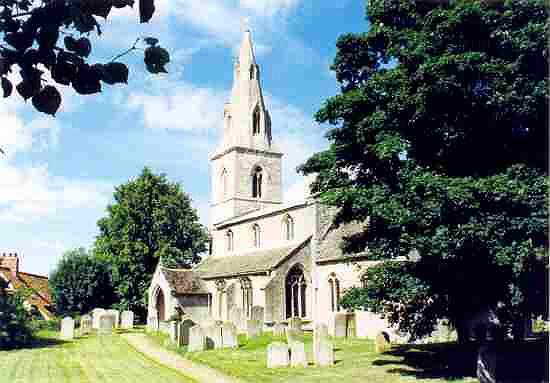
Carlby is four miles south west of Bourne, just off the A6121, but a detour is worthwhile because the village is isolated and surprisingly picturesque with a mix of attractive properties both ancient and modern, not least the old inn, now a private
residence that still boasts the wooden support post but no sign.
St Stephen's Church is predominantly Early
English and has a tower with a slender broach spire that is 700 years old.
It is situated in a quiet corner of the village that gives it an air of secluded calm which must be beneficial because a previous incumbent, Thomas Toller
Hurst, who is remembered by a tablet in the chancel, ministered
here for 53 years until he died in 1844.
Most of the church dates from the 13th century
with the upper portion being 15th century work. Some may be even
earlier, around 1200, and the church contains what is thought to
be a Saxon coffin lid. The interior is
spacious with some remains of 17th century woodwork and fragments of
a mediaeval Doom painting above the chancel arch. The church fell into disrepair
during the late 19th century and in 1912, the nave, roof and north
aisle were supported by scaffolding to prevent total collapse. The
building was saved by a tremendous fund raising drive, including
the proceeds from annual fetes, and restoration work began in 1933
with further work being carried out in 1980. Remains of mural
paintings were found during the first period of restoration and
although all could not be preserved because of damp and decay,
sufficient were uncovered to indicate that the entire church
interior had once been painted.
|
CARLBY CHURCH IN
DANGER OF BECOMING A RUIN
Held up by
scaffolding for twenty years
£1,000 NEEDED FOR
IMMEDIATE REPAIRS
The parish
church of Carlby, dedicated to St Stephen, which is situated just
off the Bourne-Stamford road, is in need of £1,000 for repairs which
should be carried out immediately. The amount required for complete
restoration has been estimated at £2,000.
The beautiful little church is of Early English architecture, most
of it dating from the 13th century. The upper potion is of 15th
century work, completed with a graceful tower and spire at the west
end. It is prettily situated just off the road, amid a number of elm
trees.
Unfortunately, the fabric has fallen into very |
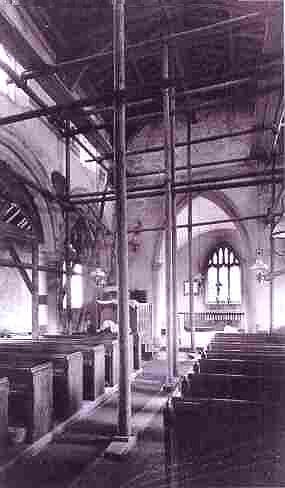 |
|
serious
disrepair and has to be supported by scaffolding. The arches on the
northern side of the nave have had to be held up, and in many places
the roof is in such a bad state through the leads slipping off that
the rain is admitted. The scaffolding has been in position no less
than 20 years and the parishioners are very anxious that this should
be removed so that the church may be restored to its former beauty
and rendered fit for worship.
The village is a very small one, comprising a little over 100
inhabitants, and at a parish meeting held recently, it was decided
to make an appeal for the necessary money. It was stated that £1,000
must be found immediately for the most urgent repairs to prevent the
church becoming a total ruin.
The Rev H P Talbot, Rector of Braceborough, was recently inducted to
the living at Carlby, to be held in plurality, and he is doing all
he can to bring the church back to its former beauty. He is hoping,
with the parishioners, that a generous response will result when the
appeal is issued.
- news report from
the Stamford Mercury, Friday 21st October 1932
OVER £1,000 RAISED FOR CARLBY CHURCH
RESTORATION
Saturday's annual effort
The residents of the pretty
little village of Carlby have one interest in common - the care of
the beautiful church of St Stephen, probably the finest piece of
13th century architecture in the district.
Up to last year or so, this edifice was in imminent danger of
collapse and had it not been for the promptitude of the people of
Carlby and the surrounding villages in answering the appeal of the
Rev H P Talbot (Rector of Carlby and Braceborough) for funds, there
is little doubt that the church would now have been but a
tumbledown relic. By means of various efforts, about £1,000 has been
collected to repair, at any rate the most dilapidated parts of the
structure.
To swell the fund, the annual fete was held on Saturday in a field
kindly lent by Mr Percy Tetley. The effort reflected much credit
upon the hard-working Parochial Church Council. Those who assisted
the Rector and Mrs Talbot in the organisation included Messrs D
Broome, H P Fitzgerald, W Bagley, W Templeman and A G Wakefield,
Mesdames E L Wakefield, A E Fitzgerald, E M Levesley and P Tetley,
and Miss Stooke (who acted as secretary).
The Rector, in an explanatory statement prior to the opening
ceremony, remarked that although various repairs had been carried
out, the interior of the church was in a very bad state. Already
they had raised no less than £1,000 (applause) and he thought that
another £800 would meet their needs.
- news report from
the Stamford Mercury, summer 1933. |
|
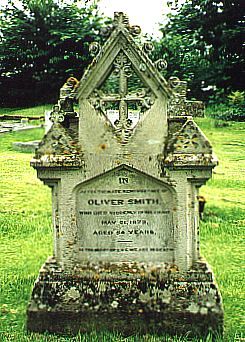 |
The churchyard is well kept with a
variety of interesting tombstones including one finely carved and
enriched with a cross and a memorial tablet that reminds us of the
feeble grasp we all have on life because it announces that Oliver
Smith "died suddenly in his chair" on May 21, 1872, aged 54
years:
"In
the midst of life we are in death." |
|
A new village sign was erected on the
village green in 2001 at a cost of £3,200 to mark the millennium. It
was worked in oak by the Northamptonshire woodcarver Norrie Dinning
and depicts familiar local features including the church, horses and
a plough and the famous Mallard locomotive that set a world steam
record on the nearby main east coast railway line in the summer of
1938. A brass plate on the supporting post is inscribed: "Presented
to the village by Carlby Parish Council to commemorate the
millennium September 14, 2001." |
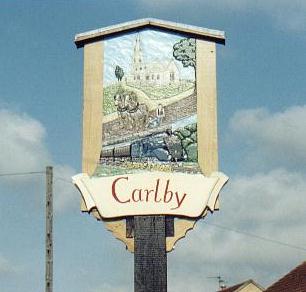 |
Two large ornamental crowns made from concrete greet visitors at the main entrance to the Eastern Farm Implements premises on the A6121 at Carlby. They
are the work of Major Cuthbert Fitzwilliams, owner of Greatford Hall, who had a
reputation for garden design and were made to celebrate the Coronation of King
George VI in 1937. Others can be found in the locality, notably in the front gardens of a pair of stone cottages in the main street at Greatford, two miles away.
|
 |
|
The village no longer has a public house since the
Plough Inn was shut in 1970 when Watneys, the brewery which owned it then, decided
that it was no longer viable to keep it open, especially as they faced
massive costs to upgrade the facilities, notably the outside lavatories.
It is now a private home although the sign post remains, without a sign,
and there is a plough in the front garden to remind passers-by of its past
existence. In addition, residents hold a pub night in the village hall
every two or three months with drinks and the usual bar games such as
darts, dominoes, quizzes, draughts and karaoke, as a reminder of the way
things were. The public house, which dated back to 1775, is pictured above
in 1950 when it was owned by the Northampton Brewery Company Limited, with
mine host Bill Simons and his wife Alice at the front wall. He was the
last publican before the hostelry closed. |
|
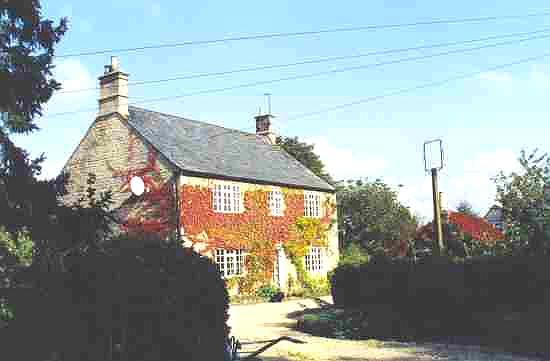 |
|
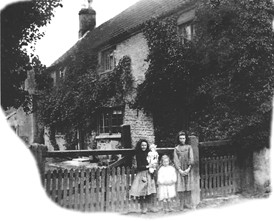 |
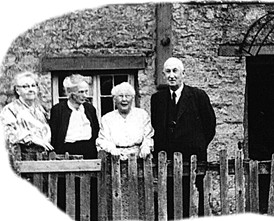 |
|
Two photographs from recent years showing (left) the Bagley sisters
outside the village grocery shop in the 1930s and (right) local villagers
outside the Old School House, Mrs Wakefield, Mrs Templeman and Mr and Mrs
Jameson. |
|
FROM THE ARCHIVES
On Thursday se'nnight [week] was
married at Carlby, near Bourne, Mr James Glenn, farmer, to
Mrs Hodgkin, a most disconsolate widow for 20 days. -
news report from the Lincolnshire, Rutland & Stamford
Mercury, 28th September 1792. |
|
CARLBY IN PAST TIMES |
|
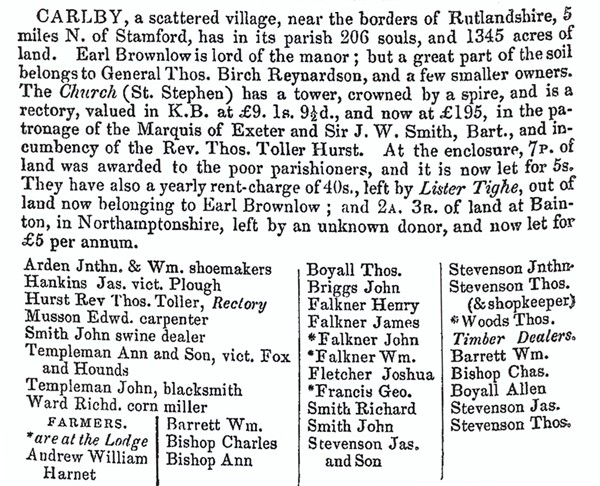
Reproduced from History, Gazetteer & Directory of
Lincolnshire 1842 by William White |
|
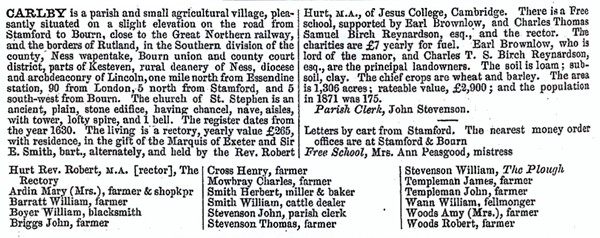
Reproduced from Kelly's Directory of Lincolnshire
for 1876 |
|
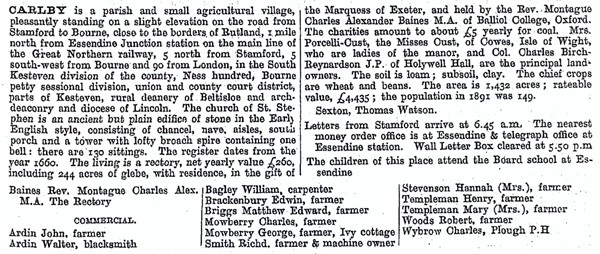
Reproduced from Kelly's Directory of Lincolnshire
for 1900 |
|
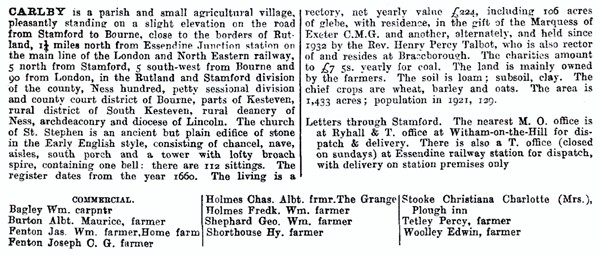
Reproduced from Kelly's Directory of Lincolnshire
for 1933 |
See also
Major Cuthbert Fitzwilliams
The Stooke brothers
Harry Barker
Farming in past times
Carlby bridge

Go to:
Main Index Villages
Index
|











